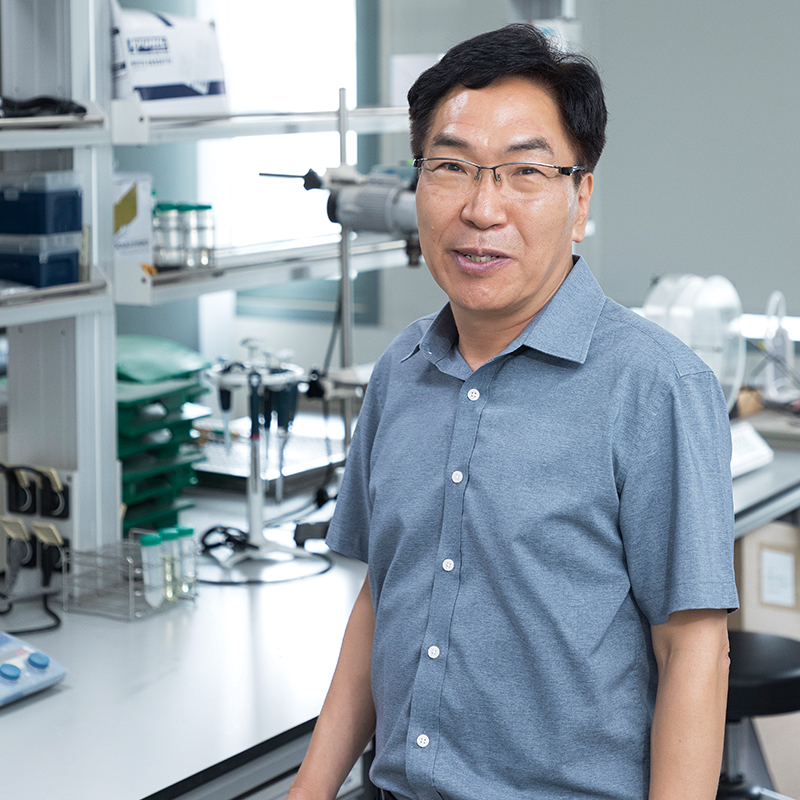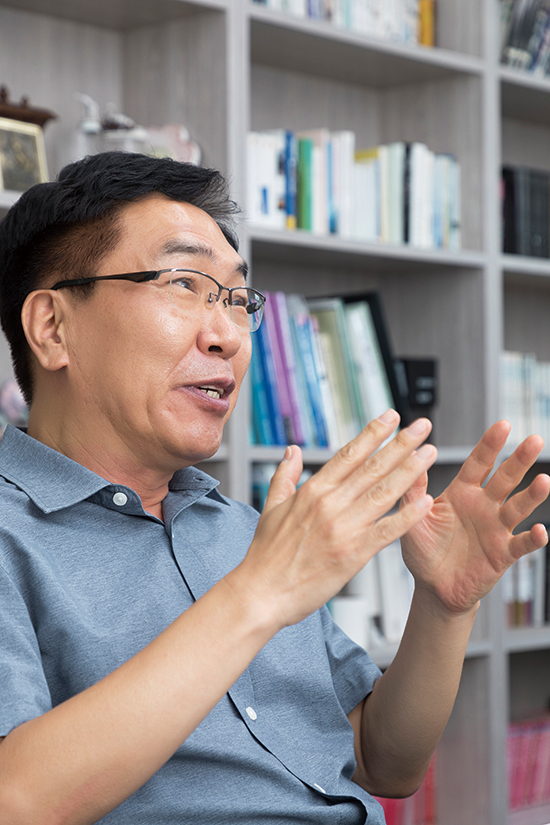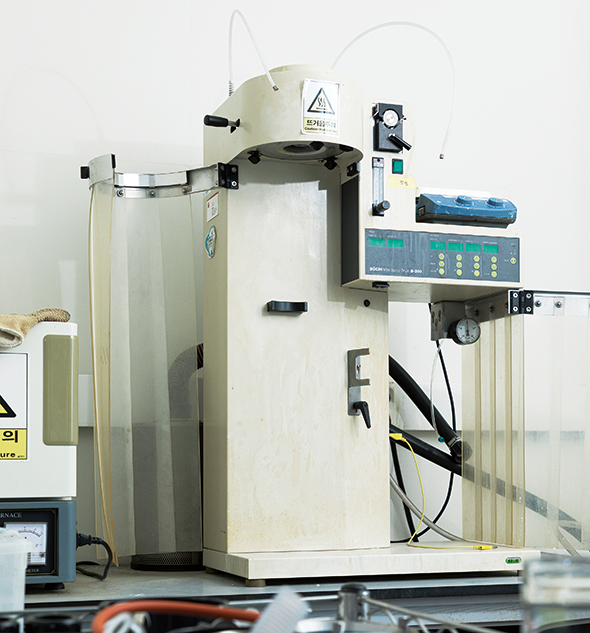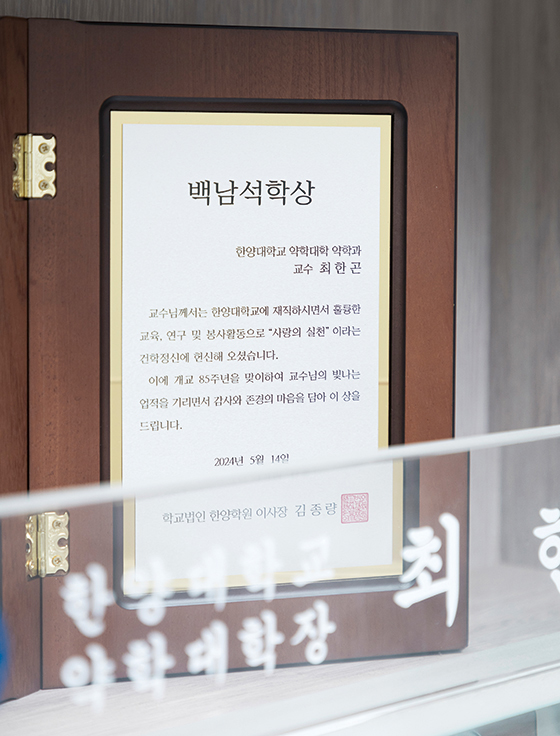Brain
Integrating AI Technology to Compile a Lifetime of Research
Professor HanGon Choi, Department of Pharmacy
The news team met with Prof. Choi to discuss his exceptional passion and significant contributions through his research in the College of Pharmacy.
- Written by · YeongIm Park
- Photo by · HyeonGu Lee

 Professor HanGon Choi has developed solubilization screening techniques and some of the world’s leading technologies.
Professor HanGon Choi has developed solubilization screening techniques and some of the world’s leading technologies.
Contributing to the Establishment of the College of Pharmacy
In May of this year, Prof. HanGon Choi of the Department of Pharmacy at Hanyang University was awarded the 12th Paiknam Prize at the university’s 85th anniversary ceremony. The Paiknam Prize honors scholars who have achieved outstanding accomplishments in education and research. Prof. Choi has achieved significant educational success, producing numerous graduate and doctoral students including five professors from Korean universities - Kyungpook National University, Keimyung University, Dankook University, and Gyeongnam National University of Science and Technology - and five professors from overseas institutions. Considering that the College of Pharmacy was established as recently as 2010, this achievement is remarkable. In the research field, he has published over 400 SCI papers and holds more than 40 patents. He has also been recognized by Elsevier, a global academic information analysis company, as one of the ”Top 2% of Researchers in the World” based on citation metrics from SCOPUS, a citation database.
Prof. Choi’s proudest achievement as a scholar, however, is not just from these accolades but rather from his role as the inaugural department chair at the founding of the ERICA College of Pharmacy. He helped lay the foundation for the department by designing the curriculum, classrooms, and laboratories, which helped establish its current standing. Therefore, Prof. Choi can be considered an exceptional scholar who has excelled in all three major area at the university: education, research, and service.
He remarked, “It is a great honor to receive the Paiknam Prize, which is not an easy award to attain. I am deeply grateful to the president and vice presidents who have actively supported our newly established College of Pharmacy. I am also grateful to the former professors who dedicated themselves to advancing our college through education and research. I would also like to extend my gratitude to my students who have always followed my guidance faithfully.”
During his acceptance speech on receiving the Paiknam Prize, Prof. Choi humbly attributed the recognition to the efforts of the faculty and students, thinking only about the development of the College of Pharmacy.
There is a reason why Prof. Choi feels a pride in the growth and achievements of the college:
“ERICA’s College of Pharmacy not only has the highest entrance scores among newly established pharmacy colleges, but also ranks 5th overall among all pharmacy colleges. In its first year, the college was selected for the BK Project Team along with new faculty members and has been involved with collective projects such as with the BK Project Team, center research institutes, and the Medical Research Center (MRC). The college has demonstrated the most growth among newly established pharmacy colleges,” he explained.
World’s Best Drug Solubilization Technology
Prof. Choi is set to retire in three years and during his career, he has achieved significant accomplishments as a researcher. His primary research areas are physical pharmacy and industrial pharmacy, which are unique to pharmacy schools and not found in medical or natural science colleges. His research focuses on optimizing drugs to achieve maximum efficacy before they are released to the market—a crucial step in the drug development process. Over the past 25 years, Prof. Choi has dedicated himself to the study of solubilization of poorly soluble drugs.
“Generally, drugs or food must pass through the gastrointestinal tract to be absorbed and be effective. However, the gastrointestinal tract only allows liquids to pass through. Drugs are categorized into soluble drugs (water-soluble) and poorly soluble drugs (not water-soluble). The latter do not pass through the gastrointestinal tract and are excreted in the feces rendering them ineffective. Surprisingly though, 70% of all drugs are poorly soluble. Moreover, high-value-added drugs such as anticancer agents (e.g., paclitaxel, docetaxel, regorafenib, and others) and immunosuppressants (e.g., cyclosporine), as well as commonly used medications like Tylenol and Advil, are all poorly soluble drugs.”
To achieve the expected efficacy of poorly soluble drugs, they must be dissolved in water to pass through the gastrointestinal tract. This requires devising optimal solubilization methods by altering the drug’s components or formulation or by adding agents. As a result of his dedication to this field, Prof. Choi has developed over 20 technologies and solubilization screening techniques, establishing himself as a world leader in this area. This is why many researchers worldwide cite his papers. While he was initially recognized as being in the top 2% of researchers globally based on citation rates, he actually falls within the top 1%.
In the 2023 ERICA Academic Awards, Prof. Choi won both the HCP Outstanding Paper Award and the Outstanding Faculty Award in the International Paper field, and he has twice received the HYU Academic Award for the best research achievements. He was also awarded the GwangYeol Yoon Award for Medicine, which is given to members of the Pharmaceutical Society of Korea who achieve outstanding research results spanning over ten years.



Utilizing AI to establish
a solubilization prediction system
in order to systematize and compile
the research on poorly soluble drugs

 At the 85th anniversary of the university’s founding ceremony, Prof. Choi was awarded the Paiknam Prize. He has achieved outstanding research accomplishments and has been recognized as one of the top 2% researchers in the world.
At the 85th anniversary of the university’s founding ceremony, Prof. Choi was awarded the Paiknam Prize. He has achieved outstanding research accomplishments and has been recognized as one of the top 2% researchers in the world.
Consolidation of Research as the Ultimate Goal
Recently, Prof. Choi’s research has taken a new step forward. He is now integrating artificial intelligence technology (AI) into the study of poorly soluble drugs. Under the project title “Establishment of an AI-Based Personalized Drug Solubilization Prediction System,” he is working with a professor in AI convergence on a fundamental research project funded by the National Research Foundation of Korea. To solubilize poorly soluble drugs, various techniques can be applied. By using AI to learn and analyze big data on the chemical structures of drugs, it may be possible to predict the most effective solubilization techniques, thus making the research process more efficient.
Prof. Choi explained, “We are utilizing AI to establish a solubilization prediction system in order to systematize and compile research on poorly soluble drugs. Once this project is completed, we will be able to solubilize any poorly soluble drug with ease.”
If Prof. Choi’s accumulated expertise in solubilization research and cutting-edge AI technology come together, they will undoubtedly blaze a path for future researchers. Prof. Choi acknowledges however, that this is a challenging endeavor and he may only achieve a portion of his expected results before retirement. Nonetheless, research will continue even after his retirement as consolidating the research on poorly soluble drugs is a lifelong task for him as a researcher. He concluded the interview by expressing his hopes as an educator:
“Being a professor means being an educator before being a researcher, so seeing my students’ achievements is the greatest reward. Watching my students become professors and enhance their research capabilities has been the most enjoyable part of my career. The College of Pharmacy has many professors with excellent research skills. I hope they will continue to maintain their research capabilities so that the ERICA College of Pharmacy can become one of the top pharmacy colleges in the country.”






